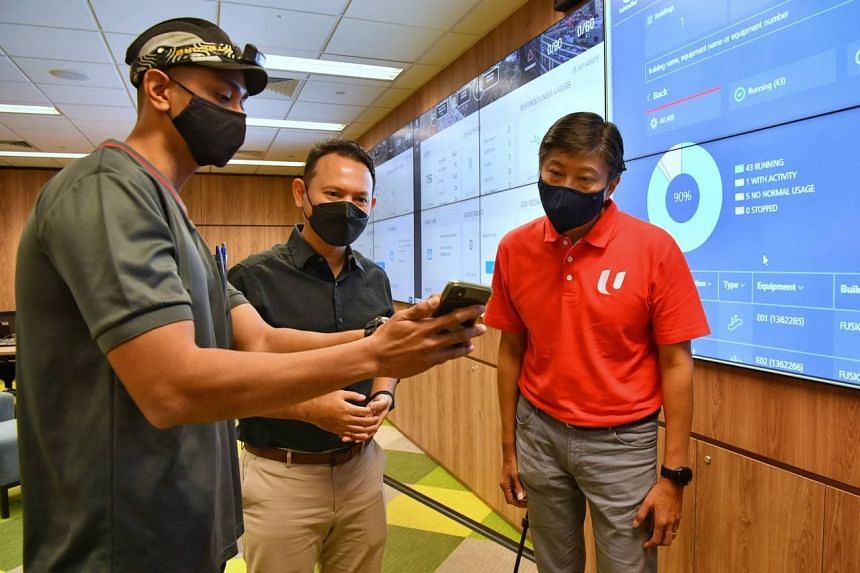Progressive Wage Model to cover local escalator maintenance workers from 2022
Sign up now: Get ST's newsletters delivered to your inbox

NTUC secretary-general Ng Chee Meng (in red shirt) and Senior Minister of State for Manpower Zaqy Mohamad being shown a workflow app on the phone of Schindler Lifts technician Abdul Razak Abd Rahman on July 16, 2021.
ST PHOTO: CHONG JUN LIANG
Charmaine Ng
Follow topic:
SINGAPORE - Local escalator maintenance workers will be covered under the Progressive Wage Model (PWM) from 2022, along with those maintaining lifts.
Both groups of workers must also receive an annual bonus of at least one month of basic wages from January 2023, under recommendations submitted by a tripartite committee and accepted by the Government on Friday (July 16).
The committee, led by National Trades Union Congress assistant director-general Zainal Sapari, also recommended annual minimum wages for lift and escalator maintenance workers in 2023 until 2028.
This will ensure that at the lowest job level, a lift and escalator maintenance worker will earn at least $2,075 a month in basic wages in 2023 - a 12 per cent jump or $225 increase from the minimum wage for 2022.
After including overtime and other wage components, the same worker may earn about $2,700 in gross monthly wages, said the committee.
The changes will benefit an estimated 1,300 Singaporeans and permanent residents who are working as technicians in the industry, of whom about 44 per cent are above 50 years old.
There are about 3,050 technicians in the industry, with about 1,750 being foreigners.
These workers service about 70,000 lifts and 7,000 escalators in Singapore.
The PWM for lift maintenance workers was introduced in 2018 on a voluntary basis, and was set to be made compulsory in 2022.
It is a wage ladder that sets out the minimum basic wages an employer must pay, based on the worker's skills. The PWM is already mandatory in the cleaning, security and landscape maintenance industries, covering around 85,000 low-wage workers.
Mr Zainal told the media on Friday that demand for lift and escalator maintenance is expected to increase in the coming years as more high-rise buildings are being built and as more emphasis is being placed on ensuring accessibility.
"The industry must be able to meet this higher demand with a strong and skilled lift and escalator workforce. Thus, we believe the recommendations... are very timely," he said.
Speaking to the media after a visit to JTC Summit in Jurong East, Senior Minister of State for Manpower Zaqy Mohamad said he hopes that the PWM will attract more graduates from the polytechnics and the Institute of Technical Education to join the industry.
"In the next few years, you will see a significant ramp-up in terms of basic wages and the industry will provide meaningful careers, especially today with a greater adoption of technology such as artificial intelligence, analytics and sensors," he added.
In its report, the tripartite committee noted that with about half of the current local lift and escalator maintenance workforce expected to retire within the next decade, attracting younger workers into the industry is key to overcoming a potential severe manpower shortage.
Setting the PWM wages for 2023 to 2028 will lay out a clear career path and wage progression for prospective workers, while the introduction of an annual bonus will help retain workers, said the committee.
"Workers will also be more motivated to stay longer with the same employer when there are more training and upgrading opportunities," it added.
"Employers will, in turn, be more incentivised to train their workers when there are better retention rates."
The committee also urged the Government to consider providing transitional wage support to enable the industry to lower its labour costs if service buyers are unwilling to renegotiate existing contracts to take into account the higher wages.
It also called for the Government to defer any further adjustments to the Dependency Ratio Ceiling (DRC), or the proportion of foreign workers a firm can employ, during the pandemic as the industry has been affected by the limited inflow of such workers.
In response, Mr Zaqy said the Ministry of Manpower (MOM) will review the requests from the committee.
On providing transitionary wage support, he said: "We understand that the market is a bit soft and the economy is impacted, so especially when you expand PWM to more sectors, we will have to review how we can help employers absorb (the higher wages) and adopt PWM holistically and in the short term as well."
He added that MOM regularly reviews the DRC and will take into account the economic conditions before making any adjustments.
On the part of service providers, the committee called for firms to reward their workers if they improve their skills, and to also seek out training subsidies and grants to upskill their workers.
Service buyers should also support lift and escalator maintenance companies on this front, and adopt more technology-enabled solutions, said the committee.
Mr Tony Khoo, representative for the Singapore National Employers Federation and co-chair of the tripartite committee, said that in the short term, employers of lift and escalator maintenance workers are concerned about how the wage increases under the PWM will lead to price increases in maintenance fees.
"But in the long term, we are more concerned about how the industry is able to attract talent to replace the ageing workforce, to raise the quality of service, and also to improve the efficiency of workers," said Mr Khoo, who is also chief executive of estate and property management company EM Services.
Mr James Lee, president of the Singapore Lift and Escalators Contractors and Manufacturers Association, said lift and escalator maintenance work requires a certain degree of physical fitness.
"Hence, I hope that service buyers will recognise and reward them for the value of services that they provide accordingly," said Mr Lee, who is also head of Hitachi's building systems business unit for Asia.

